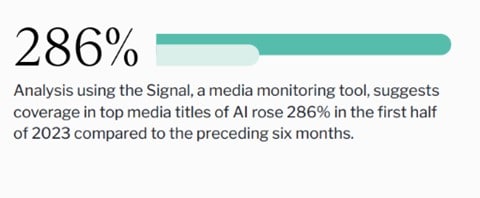How AI-powered risk management solutions can support cybersecurity and build trust
In this blog, Mark Brown, Global Managing Director, Digital Trust Consulting, sets out how AI can be used to address cyber vulnerabilities, shape trust and partner with individuals and organizations on their digital journey.
You could be forgiven for thinking AI was new on the scene, given the extent of global coverage of developments such as ChatGPT. Analysis using the Signal monitoring tool suggests coverage in top media titles of AI rose 286% in the first half of 2023 compared to the preceding six months[1]. In fact, it’s been revving up for years.

What’s new is that AI is now crossing into mainstream technology at a consumer level. This brings added risk. Importantly, it offers the added opportunity to positively shape our future, including when it comes to making us more cyber-secure.
Bridging the societal gap

Clearly, AI is here to stay – in BSI’s Trust in AI Poll[2] 38% of people globally said their job involves AI on a daily basis, and it’s already firmly embedded within business operations and everyday consumer interactions[3]. Yet the speed of this shift means there could be a gap between the pace of change and public understanding of it.
Awareness is key here – helping people to understand that when they put data into systems, it is likely to be used with the intent of providing benefit to the consumer – but there is also the potential for it to be used for other purposes, for example, to sell them something.
It’s worth noting that whilst figures suggest the number of data breaches is going down[4], the number of records being breached is going up[5] as big tech firms increasingly find themselves being targeted. Now is the moment to upskill the public - and fast.
AI as the cybersecurity gatekeeper
Major enterprise organizations already utilize security information and event management (SIEM) tools to monitor activity and remain alert to threats. At BSI alone, we average around 150 million security log events per month[6]. For humans this is like searching for a needle in a haystack and that is the security opportunity for AI - to provide real-time data analysis based on a set of algorithms and rules which are predetermined by the controls we operate as an organization.
The potential improvement is clear – shifting these tasks to AI could allow issues to be identified far quicker and without taking up employee time and energy[7]. Then there’s the prospect of the AI analysis presenting an opportunity to take remedial action before an incident becomes significant.
There is, of course, a critical role for humans. People remain cautious about the use of AI for cybersecurity purposes, with 47% saying they would need complete or a lot of trust in AI to take on the responsibility of, for example, identifying unusual or spam email activity. In the future, the ideal situation will be cybersecurity managed as a partnership between people and AI.
Assessing the risk appetite
Against this backdrop, organizations can assess their risk appetite – do they view security as a bare minimum cost, or a route to engaging the trust of employees, consumers and institutional investors?[8]
Organizations may well see that, with additional investment, AI can enable them to enhance their cybersecurity, privacy or digital risk landscape and act as a proactive as well as preventative tool. IBM found that the average time to detect a breach is more than six months[9] but that AI or automation cut breach lifecycles by 108 days. AI can be a game-changer.
Ultimately, those who put building greater digital trust at the heart of their strategy are ideally positioned to thrive on the rapidly evolving digital journey. As we accelerate towards Society 5.0, AI can play a central role in tackling cyber risks – acting as a force for good by making us safer and more secure as individuals, organizations and society.
This content is from BSI’s Shaping Society 5.0 campaign. Download Mark’s full essay here or access others in the collection here.
Mark Brown, Global Managing Director, Digital Trust Consulting, BSI

Mark is an expert in cybersecurity, data privacy and business resilience. Mark uses his wealth of knowledge on the Internet of Things (IoT) and the expanding cybersecurity marketplace to support organizations as they grapple with digital transformation and in addressing new technology that brings new business risks.
[1] Figure based on a Signal search of articles where artificial intelligence was detected as a topic in publications identified as 50 of the most influential, comparing H2 2022 with H1 2023. In H2 2022, there were 2,743. in H1 2023, there were 10,594
[2] BSI partnered with Censuswide to survey 10,144 adults across nine markets (Australia, China, France, Germany, India, Japan, Netherlands, UK, and US) between 23rd and 29th August 2023
[3] How Amazon uses AI to prevent damaged products from arriving on your doorstep, Amazon, July 2023
[4] Data breaches declined by almost half in Q1 2023, study finds, TechInformed, May 2023
[5] Cost of a data breach: behind the numbers of a cybersecurity response plan, Secureworks, July 2021
[6] Figures from internal BSI data for year-to-date 2023
[7] Stay Ahead of Cybersecurity Threats by Leveraging AI, Aabyss, June 2023
[8] Why digital trust truly matters, McKinsey, September 2022
[9] Cost of a Data Breach Report 2023, IBM, July 2023



